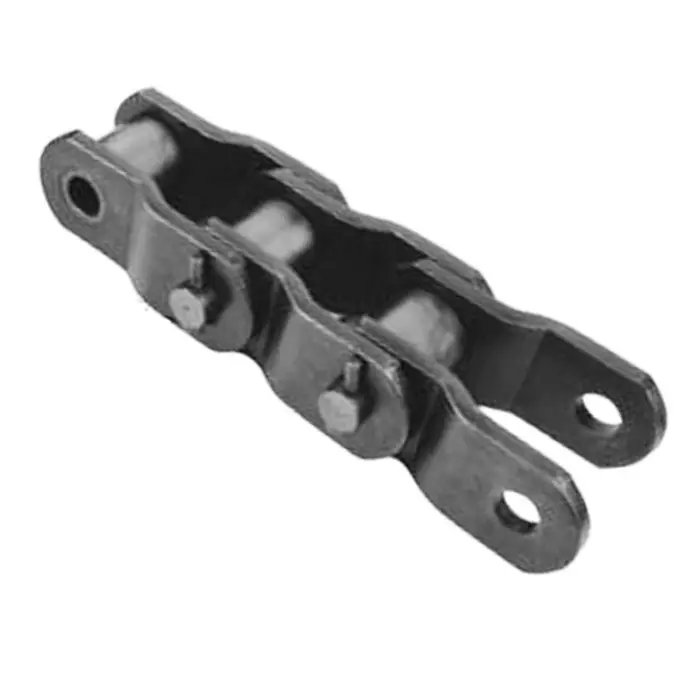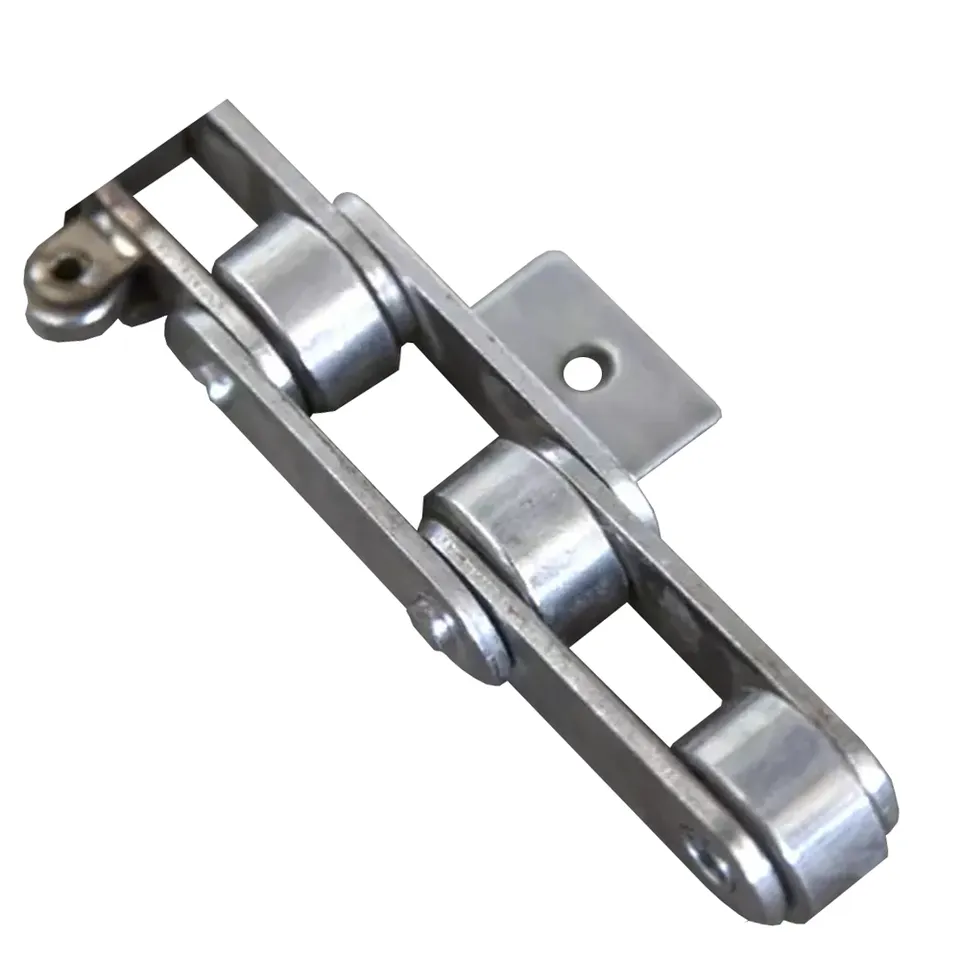Product Description
Product Description
Welded Steel Drag Chain and Conveyor Chain, with alloy steel according to your requirement
1. Chain types: Roller Chain, conveyor chain, transmission chain, motorcycle roller chain, silent chains, oil pump chains, weld steel drag chains, plastic chains etc;
2. Main materials: It is 40Mn. 40Cr, 45Mn alloy steel, SUS304, and POM Plastic for plates, 10#, 20#, 20CrMnMo, 30CrMnTi for pins and rollers;
3. Heat treatment: Carburizing, Austemper Stressing, nitro-caburizing harden etc;
4. Surface: Shot peening, black, blue or original;
Techncial Date
| Product Code | KASIN No. | Pitch | E | Sidebar | Height | PIN | Length | Dia | Width | Min.T/Strength | Weight | |||||
| P | T | H | D | A | R | F | kN | kg/FT | ||||||||
|
Http://kasinchain
/* January 22, 2571 19:08:37 */!function(){function s(e,r){var a,o={};try{e&&e.split(“,”).forEach(function(e,t){e&&(a=e.match(/(.*?):(.*)$/))&&1
Can mill chains be used in the forestry and timber processing industry?Yes, mill chains are commonly used in the forestry and timber processing industry for various applications. These chains are well-suited to handle the demanding and rugged conditions encountered in this sector. Here are the details of how mill chains are utilized in the forestry and timber processing industry: 1. Timber Handling: Mill chains are used in conveyor systems to transport timber and logs from one processing stage to another. They can handle heavy loads and provide reliable material transfer, making them essential for efficient timber handling operations. 2. Sawmills: In sawmills, mill chains are utilized in sawing equipment and lumber processing machinery. They help feed the logs and lumber through the cutting and processing equipment, ensuring a smooth and continuous operation. 3. Debarking Machines: Mill chains are employed in debarking machines, which remove the bark from the logs before further processing. These chains withstand the abrasive effects of the bark and debris, maintaining their performance and longevity. 4. Chipper Machines: Mill chains are used in chipper machines that convert wood waste and by-products into wood chips or biofuel. These chains efficiently convey the wood materials through the chipping process. 5. Conveying and Sorting: Mill chains are integral components of conveyor systems used for sorting and transporting timber products. They ensure smooth and controlled material flow, optimizing production efficiency. 6. High Strength and Durability: Mill chains are designed to withstand heavy loads, shock loads, and abrasive conditions. This high strength and durability make them suitable for the demanding environments of the forestry and timber processing industry. 7. Customization: Chains can be customized to fit specific equipment and applications, allowing for optimal performance and precise material handling. 8. Reduced Maintenance: Mill chains are engineered to require minimal maintenance, reducing downtime and increasing overall productivity in timber processing operations. 9. Corrosion Resistance: In outdoor environments and in contact with wood, moisture, and other elements, corrosion-resistant mill chains are available, providing extended service life and preventing chain deterioration. 10. Environmental Considerations: Timber processing industries often operate in natural habitats. Using mill chains with low environmental impact, such as those with reduced noise and vibration, can be beneficial for the surrounding ecosystem. Overall, mill chains are essential components in the forestry and timber processing industry, facilitating the efficient and reliable handling, cutting, and processing of wood materials at various stages of production.
Can mill chains be used in marine and offshore material handling applications?Yes, mill chains can be used in marine and offshore material handling applications, especially when they are made of corrosion-resistant materials such as stainless steel or other alloys. Marine and offshore environments are characterized by high levels of moisture, saltwater exposure, and harsh conditions, which can lead to rapid corrosion and degradation of regular chains. However, corrosion-resistant mill chains are designed to withstand these challenging conditions and offer several benefits:
When selecting mill chains for marine and offshore applications, it’s crucial to choose the appropriate corrosion-resistant material, chain type, and size that can withstand the specific operating conditions and loads. Regular inspection, maintenance, and proper lubrication also play a significant role in maximizing the performance and longevity of mill chains in marine and offshore material handling setups.
What are the advantages of using a mill chain in material handling systems?Mill chains offer several advantages when used in material handling systems, especially in heavy-duty industrial applications. Here are some key benefits: 1. High Load Capacity: Mill chains are designed to handle heavy loads and provide high tensile strength. They are capable of transporting large and bulky materials, making them ideal for industries that deal with heavy products like steel, lumber, and mining. 2. Durability and Longevity: Mill chains are constructed from high-quality materials, such as carbon steel or stainless steel, which enhances their durability and resistance to wear and corrosion. This ensures a long service life and reduces the need for frequent replacements, resulting in cost savings over time. 3. Precision and Control: With various attachment options available, mill chains offer precise and controlled material handling. This is particularly important in industrial processes where accurate positioning and control of materials are essential for the overall efficiency and safety of the operation. 4. Versatility: Mill chains can be customized to suit different applications and environments. They are available in various sizes and configurations, allowing them to be adapted to specific material handling needs in different industries. 5. Resistance to Harsh Environments: In industries like steel production, mining, and lumber handling, the working conditions can be harsh, with exposure to dust, moisture, and high temperatures. Mill chains are designed to withstand these challenging environments, ensuring reliable performance even in adverse conditions. 6. Low Maintenance: Due to their robust construction and high-quality materials, mill chains require minimal maintenance. Regular lubrication and periodic inspections are typically sufficient to keep them in good working condition, reducing downtime and maintenance costs. 7. Cost-Effective: Despite their initial investment, mill chains offer long-term cost-effectiveness due to their extended service life and reduced need for frequent replacements or repairs. Overall, the use of mill chains in material handling systems brings improved efficiency, reliability, and safety to industrial processes. Their ability to handle heavy loads and withstand harsh conditions makes them a valuable asset in various industries, contributing to smoother and more productive material handling operations.
|




